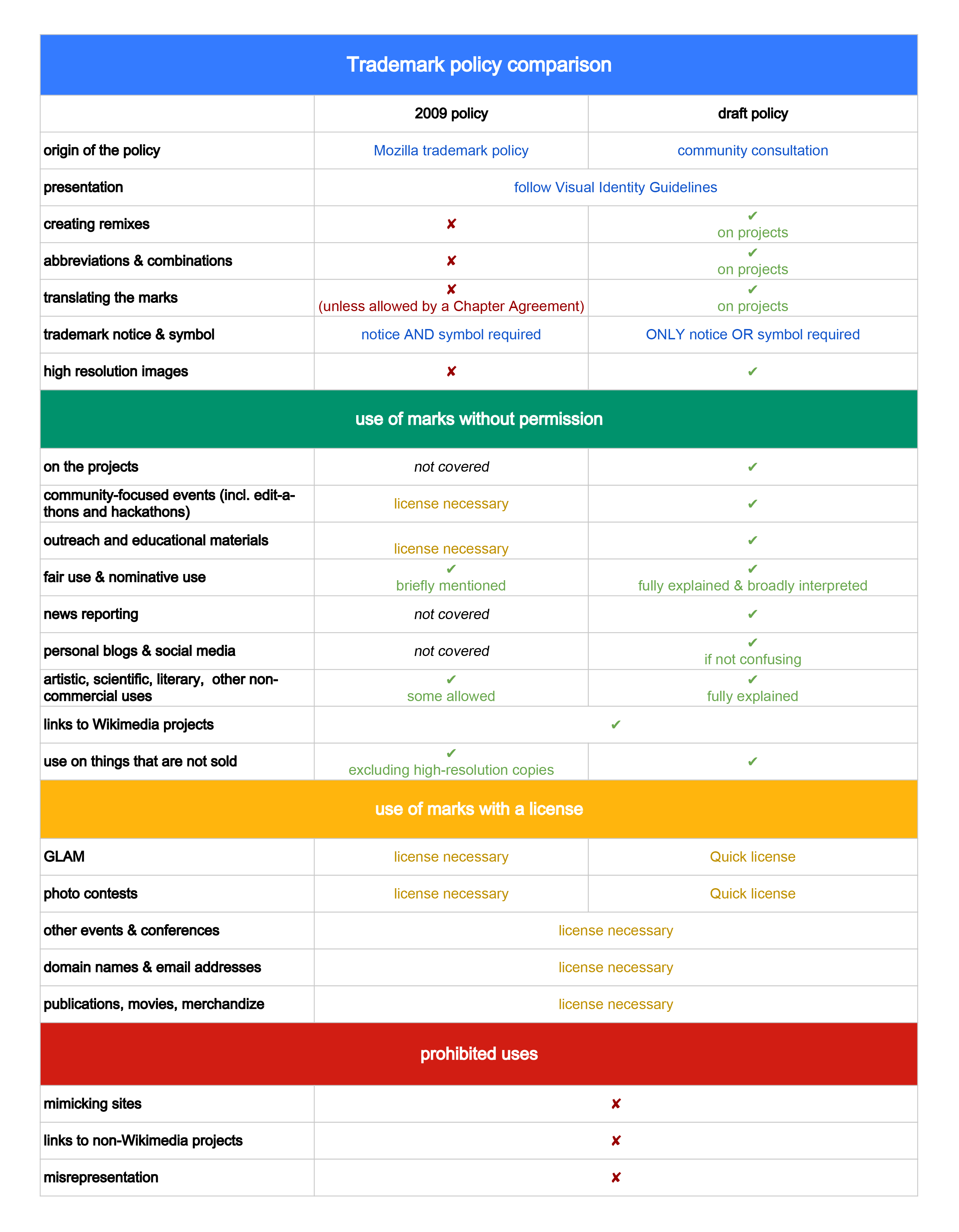The Wikimedia sites are built by a community of volunteers. Today, we finalized a new trademark policy that is specifically tailored to the innovative events and outreach that Wikimedia volunteers conduct to build sites like Wikipedia and its sister projects. The policy was developed through a seven month long consultation with our community of users. It received almost 550 comments and over 130 changes to the policy (you can actually see all changes to the draft in the wiki revision history).
Together, we created a policy that will empower the collaborative community that makes the Wikimedia sites thrive. Focusing on the community, the new policy is unconventional in how it provides expansive use of the Wikimedia marks while maintaining legal protection. It was designed to be clear and easy to understand, with the help of an information design workshop at Stanford Institute of Design. The result of our work is released under a Creative Commons license, so feel free to build on it when designing a policy for your own trademarks. (Just make sure to change the trademarks in the policy!)
The new policy makes it easier for community members to use the marks in the following ways:
- New uses of marks without requesting a license: The new policy contains an intuitive summary listing the many ways community members may use Wikimedia marks without a separate license. It allows community members to use the marks on all Wikimedia sites and even outside the sites to facilitate common activities that advance our mission.
- Clearer explanation of fair use: Our consultations revealed confusion over how to use Wikimedia marks under fair use and whether US fair use laws would apply in countries that do not recognize the same fair use rights. The policy now clearly describes many examples of how Wikimedia marks may be used in, for example, news reporting without additional permission, regardless of where the user resides.
- Streamlined licensing procedures: We are introducing a “Quick license,” which grants community members the ability to quickly start using Wikimedia marks for a photo contest or GLAM event after emailing it to us. No need to wait for approval! Quick licenses are easy to read. They include only the most essential provisions, with a brief explanatory key of each provision.
-
Straightforward language: Unlike the policies of many other companies, our new policy uses simple words, short sentences, and straightforward sentence structure to make it easier to follow. We recognize that some readers of the policy may not be native-English speakers, so we avoided using legalese to ensure easy translation into multiple languages. To verify the simplicity of the language, we applied various readability indices and rewrote text flagged as difficult until it had a better readability score.
-
User-friendly layout: After considering cutting-edge information design principles, we used icons, color coding, typography, and white space to make the policy both visually appealing and easily accessible. Many community members approved of the design, and felt that, “it’s very approachable and easy to read.” We also included a color-coded summary to provide a brief overview of how to appropriately use the Wikimedia marks.
-
Many helpful Frequently Asked Questions: The new FAQ section includes answers to 86 questions, compared to a mere 24 in the 2009 policy. The FAQs are based on issues that commonly arise in our trademark licensing process and questions raised during the policy discussions. In addition, the FAQs are grouped in categories that mirror the trademark policy provisions and are interlinked with relevant provisions to allow easy navigation between the two documents.
The new policy will now be presented for review to the Wikimedia Board of Trustees. If approved, it will replace the existing policy from 2009. The old policy became outdated with the rapid expansion of the Wikimedia projects that introduced new and unanticipated uses for the Wikimedia marks. A table at the end of this blog post shows how the new policy compares to the 2009 policy.
The development of this innovative policy could not have been possible without the hard work and dedication of the Wikimedia community. With their collaborative input, we were able to expand and clarify provisions of the policy to better serve the needs of community members in their work to promote and improve Wikimedia projects. The permissive use of marks is unmatched by the policies of other websites. We sincerely thank community members who participated in the policy discussion for once again making Wikimedia innovators of the online world.
Yana Welinder, Legal Counsel *
Geoff Brigham, General Counsel
* Many thanks to Stephen LaPorte and Manprit Brar for all their work with this blog post and the trademark policy generally. We would also like to thank everyone at WMF who worked hard to make the new policy possible.

Can you help us translate this article?
In order for this article to reach as many people as possible we would like your help. Can you translate this article to get the message out?
Start translation